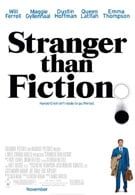This is a movie about Harold Crick. Harold is good at many things. He excels at his job. He's a whiz with numbers. He's not very good at life. This is a movie about Harold Crick getting better at life by facing death, a conceit used almost to the point of exhaustion by other films, but revitalized by Stranger Than Fiction's fresh approach to certain doom.
Harold (Will Ferrell) wakes up one morning and hears a voice while brushing his teeth. The voice isn't talking to him so much as it's talking about him. The voice is right about a great many things, and so when it says "little did he know that events had been sent in motion that would lead to his imminent death", Harold has reason to take it rather seriously.
Karen Eiffel (Emma Thompson) is writing her new novel. She's been writing it for ten years. She needs to kill off her main character, but can't figure out how to do it. The character's name is Harold Crick.
Stranger Than Fiction never sets out to explain how Harold came to be a character in Karen's book. Like a terminal illness in any story where a protagonist must face a certain near-future demise, it's here to serve as motivator. Karen Eiffel is Harold's brain cloud or ominously foretold car wreck. Why or how she'll end him matters only to her, for us it's just a question of what he'll do with what time he has left.
Harold responds with all the usual stages of reaction. He goes into denial, he tries to stop it, he makes the most of the time he has left. Yet though Harold goes through all the usual motions he does so without the usual Hollywood overreaction. There's no lavish resort vacation or trip around the world with Meg Ryan and a Ukulele for Crick. The always deadpan Will Ferrell keeps him low-key. There's no massive personality shift, simply small changes as our hero faces up to the details he's been missing in life.
Stranger Than Fiction revels in those details. Emma Thompson's narration is lush with rich language and nuance as she describes the broader strokes of Harold's life by exalting the smaller parts. Writer Zach Helm's script makes describing Harold's wristwatch an artform, a discussion of a store's selection of guitars becomes an examination of what it means to be a man with a six-stringed ax.
Eiffel's running commentary is the perfect accent to Crick's existence, and director Marc Forester's strange animated visual cues prove both humorous and insightful. Now if only there was more of it. Karen's sumptuous narration sounds off throughout the film almost sporadically, for long stretches it disappears entirely only to emerge as if recovering from a long drought. The movie doesn't stick with its premise consistently enough; Eiffel's narration should have served as a soundtrack to the entire film, rather than as an occasional mcguffin.
That doesn't mean Harold's story on its own isn't affecting. Ferrell's reserved take on the character makes him quietly sweet and sympathetic; he dodges easy laughs and avoids the temptation to undermine the film by making Harold ironic. You'll find yourself really rooting for him even though it takes most of the movie to figure out where you're rooting for him to be going. Thompson is brilliant as the obsessed, disgusting, disheveled writer Karen Eiffel; though it's really the way her occasional voiceovers interact with Harold that steal the film.
Since first receiving acclaim for Monster's Ball in 2001, Marc Forster has carved a career out of making low-key, imaginative, character-driven movies with big impact. Stranger Than Fiction isn't his best of those movies (I'd vote for his underappreciated 2005 movie Stay), but it's another inventive bright spot on his growing resume. While this one may be his least challenging, Stranger Than Fiction is a jaunty little existential oddity that audiences are bound to love.
Most Popular





